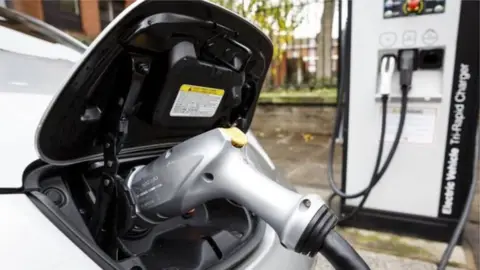UK's clean car goal 'not ambitious enough'
 Getty Images
Getty ImagesThe government’s ambition to clean up motor vehicles by 2040 is not ambitious enough, a leading energy expert says.
Professor Jim Watson, head of the prestigious UK Energy Research Centre, said the target should be at least five years earlier, as in Scotland.
The government is currently considering obliging new cars to run on electricity for at least 50 miles by 2040.
The government said it would not discuss the issue before it had published its policy which is due soon.
But ministers are facing competing pressures on the issue. Some UK car firms are telling ministers their proposed targets are unachievable, while others say the targets can easily be reached.
Push and go faster
Professor Watson, who started working life as a car engineer, says the motor industry has a history of saying targets are impossible, then suddenly finding new models to do the job.
“It’s great that they [the government] are having a target, but it could be much more ambitious,” he told BBC News.
“If you push industry further they could go faster.
“Sometimes the car industry has done itself a great disservice by lobbying against environmental standards and then finding itself in trouble when the oil price goes up and people want cleaner, more efficient cars.”
“They should embrace it [a strong target] and ask government to regulate them harder.”
Extinction
Professor Watson was referring to the long campaign by US car makers against tighter efficiency standards – a battle that ended when the manufacturers faced bankruptcy because in part their models were inefficient.
In effect, the US car firms were so successful with lobbying that they nearly lobbied themselves into extinction.
 PA
PAOne UK car firm spokesman told me: “We don't have a good record on this – the industry has cried 'wolf' too often in the past.”
The Society of Motor Manufacturers and Traders told BBC News it rejected this suggestion.
There is certainly a range of views among UK car firms about the advisability of the 2040 target. Jaguar Land Rover (JLR) has said publicly that it expects to meet the government’s current proposed standards long before the set date.
A spokesman said: “From 2020, every new Jaguar and Land Rover will have the option of electrification.
“This (2040 target) is 22 years away - or seven new cars away for many new car buyers on a typical ownership cycle. We are confident that every new Jaguar or Land Rover will meet the proposed criteria long before 2040.”
Ill-considered
Nissan told BBC News it supported clean car targets. A spokesman said: “As the pioneer of electric vehicles, we welcome plans that encourage people to switch to low or zero emission vehicles.”
But other manufacturers discussing the issue on condition of anonymity told BBC News the proposed 2040 standards are ill-considered.
One criticised the idea currently under consideration by the Department for Transport to force hybrid cars, by 2040, to have the capacity to travel 50 miles without burning fossil fuels.
The car maker said this would require a much bigger battery entailing more weight and cost. That extra capacity would be redundant for most of the time for an average driver.
Barrage of criticism
The issue is causing headaches for many other governments needing to cut emissions that cause local air pollution and climate change.
India’s transport minister announced 2030 as a day beyond which only all-electric cars may be sold.
But after a barrage of criticism from car firms, he rescinded the order, and India’s policy is not yet clear. Tata Motors in Delhi did not want to comment on whether it could cope with a 2030 all-electric policy.
What is certain is that in Europe and Asia, car makers are being expected to move inexorably towards low or zero emissions vehicles.
Charging infrastructure
The car makers admit they face uncertainty over the future. After decades of homogenisation of world markets, they may find themselves manufacturing electric cars to access the Chinese economy on the one hand and petrol SUVs for Texas on the other.
Car makers think China will probably become a world leader in car standards – especially in cities.
The UK car firms are in concert on one issue: the need for the government to radically improve the supply of charging infrastructure, and to increase incentives to buy low-emissions cars.
They told BBC News ministers would need to move swiftly to accelerate demand for clean cars, or it would be impossible to step up production levels to the amount needed by 2040.
Electric and hybrid cars currently constitute 1.4% of the current UK fleet. Of new sales, 4.7% are clean fuel – that’s 119,786 out of 2.54 million cars sold last year.
Mike Hawes from the SMMT told BBC News: "Vehicle manufacturers will increasingly offer electrified versions of their vehicles giving consumers ever more choice but industry cannot dictate the pace of change nor levels of consumer demand."
Environmentalists say this is a red herring – car buyers, they say, will buy whatever vehicles are permitted to be sold in the country at that time.
The environment department Defra is concerned that their colleagues in transport at DfT have had their ambition dulled by car industry lobbying.
One Defra source told me: “They are chancing their arm. The targets for 2040 are not ambitious at all.”
The DfT didn’t want to address that comment.
Follow Roger on Twitter @rharrabin
